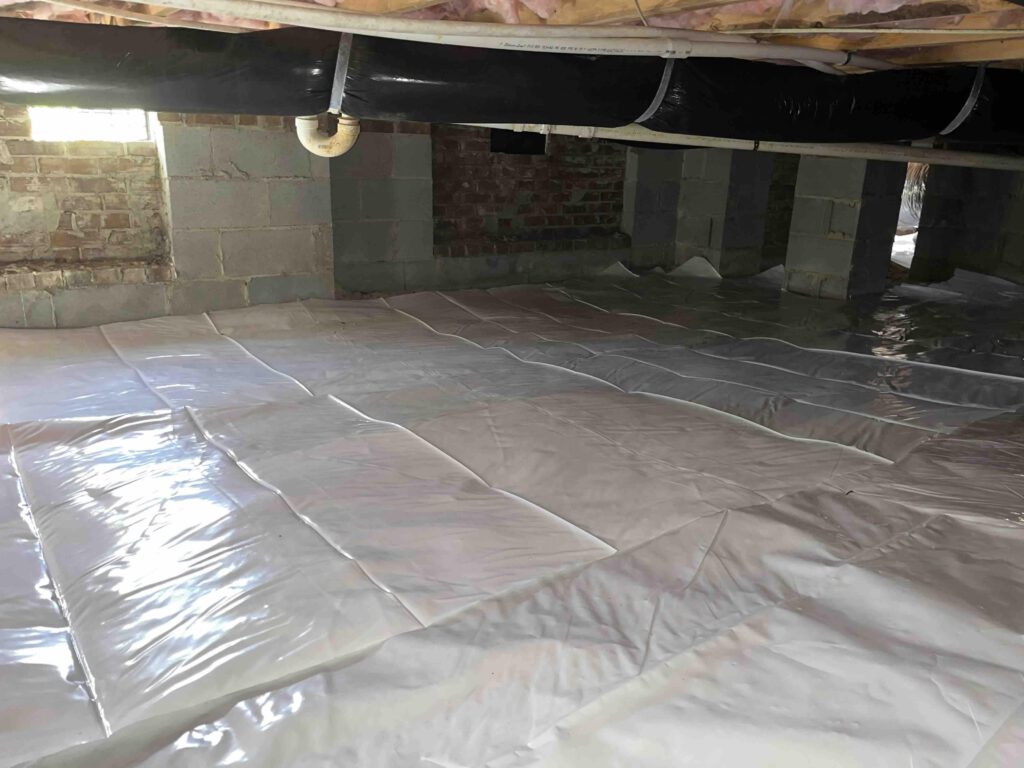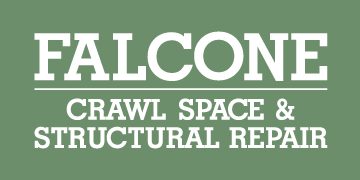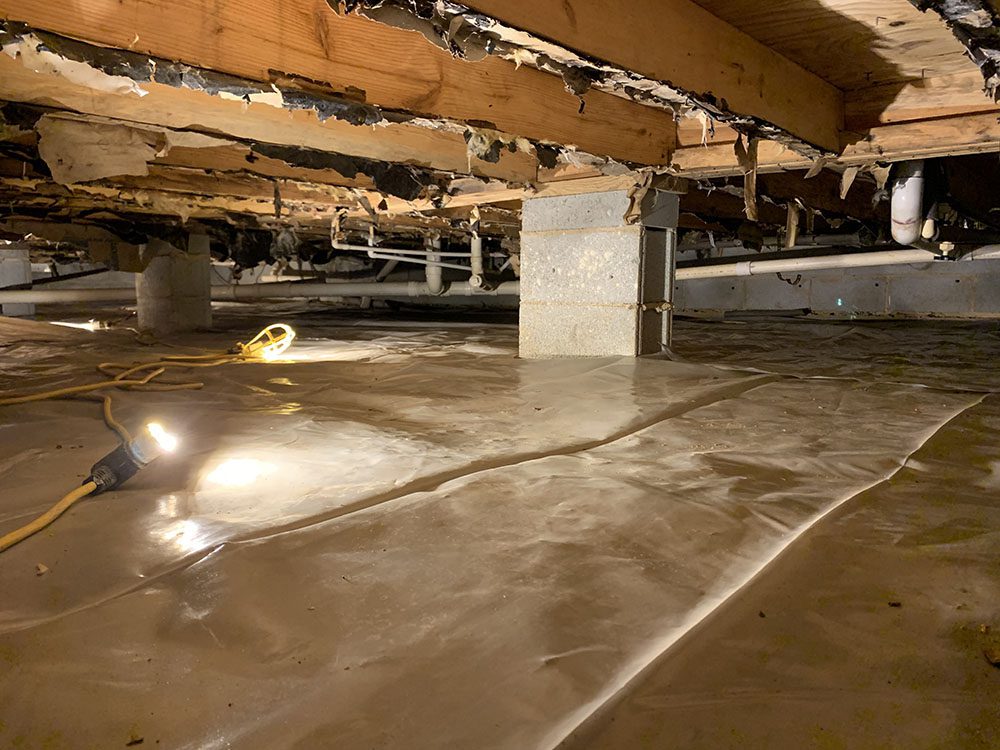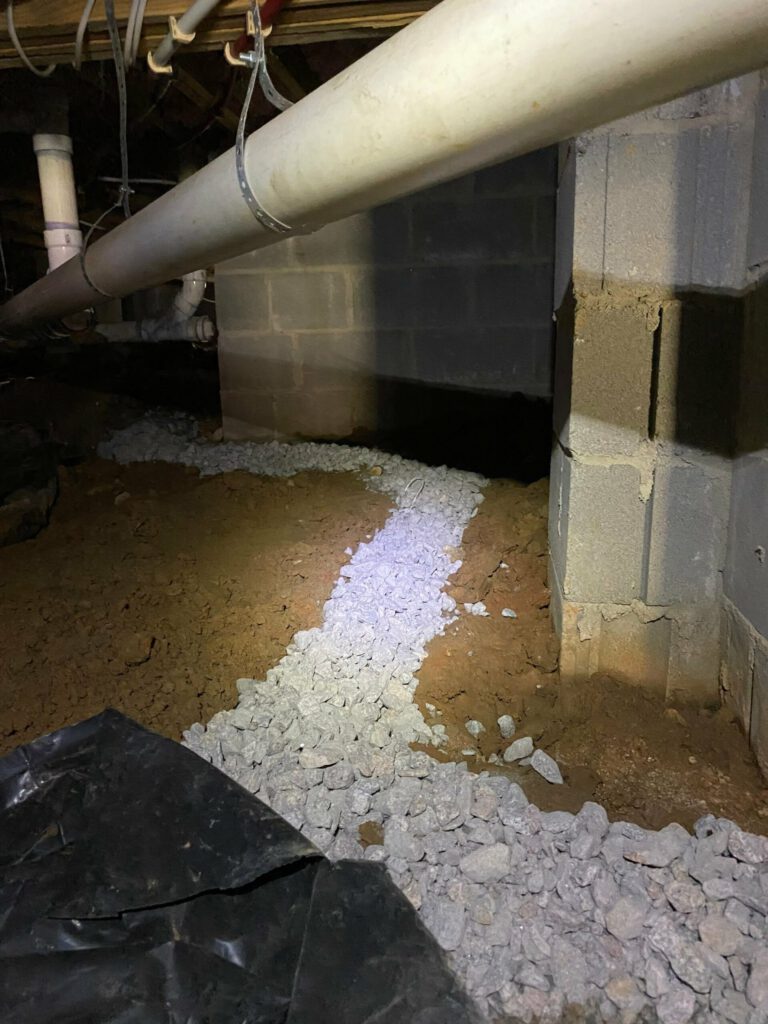Crawl Space Vapor Barriers: Necessity in Charlotte, NC?

You might be wondering if a crawl space vapor barrier is worth the effort. How badly do homeowners need something like this in the North Carolina climate, and how much can they help? Let’s look at what installing a crawl space vapor barrier in Charlotte, NC, can do for you.
What Is a Vapor Barrier?
Vapor barriers are sheets of a material, usually plastic or vinyl, that help fight against moisture diffusion within a building. You can erect these barriers within your walls, floors, and crawl space. They’re instrumental in controlling moisture in crawl spaces or basements.
The term “barrier” is a misnomer since it doesn’t completely stop the moisture from transferring through. Any material will still have some permeability, meaning water could still find its way through, even to a small degree. You might also hear barriers being called “moisture barriers” or “vapor retarders,” but these terms are interchangeable and mean the same thing.
There are a lot of materials to choose from for your vapor barrier. Some will be coatings for thicker sheet materials like insulation or stainless steel. These barriers can fasten and seal at the joints of the material you attach them to. These are more suited for commercial building and/or walls of some homes.
Other standard options include polyethylene sheeting or foil-backed wallboard. These options can offer some more flexibility and usually come in rolls. They’re more suitable if you add a vapor barrier to an existing part of your crawl space rather than building new pieces. Crawl spaces are typically polyethylene or vinyl sheeting.
Interesting fact: vapor barriers must be black in Oregon and Washington to meet code.
Benefits of a Vapor Barrier
There are many perks to having a vapor barrier, not just for those living in North Carolina. Moisture and mold control are big issues with crawl spaces. Vapor barriers curb mold growth since moisture is one of mold’s favorite things.
But mold isn’t the only intruder in your home that likes things humid. Insects and pests like termites or rodents prefer a moist environment. The last thing you ever want to find in your crawl space is a horde of pests silently wreaking havoc on your home.

How the Carolina Climate Affects Vapor Barriers
People in drier climates get off easy — they don’t have to worry much about high moisture levels in their homes. But North Carolina has a highly moist climate, so a lot of moisture is retained in the dirt and soil surrounding a building. The Carolinas are also subjected to high humidity and prone to storms and even hurricanes, making vapor barriers much more valuable.
North Carolina is also no stranger to flashes of cold weather. That can spell trouble for homes that retain moisture. Ice can destroy your home’s infrastructure if temperatures drop below freezing.
The Installation Process
Installing a vapor barrier properly is no small feat, especially in a humid climate. Your goal should be to find installers who understand the local codes, have a quality control process, and specialize in crawl space work. Local companies also have an advantage since their entire scope of work is confined to working with North Carolina homeowners.
A vapor barrier installation isn’t a small task, and installing it in an existing home can be even more challenging. That’s why it’s wise to find crawl space professionals who can assess your home and fit you with the proper protection.
The average vapor barrier cost can vary significantly since no two crawl spaces will be identical. You could spend anywhere from $1,000 to $5,000, depending on how much square footage you cover, height of crawl space, and the amount of debris that must be removed before installing a new vapor barrier. But because a vapor barrier can save you on repair costs or pest control in the future, it’s more often than not a worthwhile investment.
Do You Need a Crawl Space Vapor Barrier in Charlotte, NC?
The verdict is an overwhelming yes — every homeowner in North Carolina would see some benefit from having a vapor barrier in their crawl space. If you have yet to install one, now’s the time to find an industry professional who can guide you through the process so your home stays protected from the threat of moisture. In North Carolina and South Carolina it is also code to have a vapor barrier installed in the crawl space.
Common Questions About Vapor Barriers:
Q: In your experience, what material would you say works best?
A: Polyethylene is a common and effective material for crawl space vapor barriers. It is durable, resistant to moisture, and provides an excellent barrier against ground moisture.
Q: Will a crawl space barrier make my crawl space in my Charlotte home too airtight?
A: While a vapor barrier helps control moisture, it’s not intended to make the crawl space airtight. Proper ventilation and air circulation may still be necessary to maintain a healthy environment. This would be more of an encapsulation to get “airtight.”
Q: What’s the maintenance recommended for a crawl space vapor barrier?
A: Regular inspections, at least annually, are recommended if you have a vapor barrier in your Charlotte crawl space. Look for any signs of damage, shifts in the barrier, or water accumulation, and address issues promptly.


